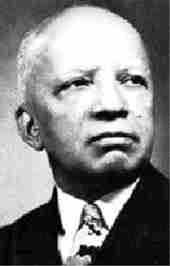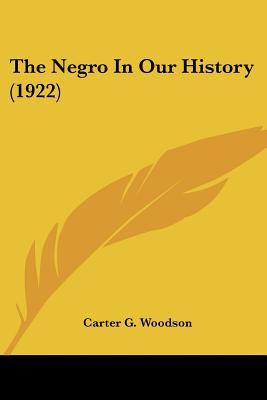
Convinced that the role of his own people in American history and in the history of other cultures was being ignored or misrepresented among scholars, Woodson realized the need for research into the neglected past of African Americans. Along with William D. Hartgrove, George Cleveland Hall, Alexander L. Jackson, and James E. Stamps, he founded the Association for the Study of Negro Life and History on September 9, 1915, in Chicago. That was the year Woodson published The Education of the Negro Prior to 1861. His other books followed: A Century of Negro Migration (1918) and The History of the Negro Church (1927). His work The Negro in Our History has been reprinted in numerous editions and was revised by Charles H. Wesley after Woodson's death in 1950.
In January 1916, Woodson began publication of the scholarly Journal of Negro History. It has never missed an issue, despite the Great Depression, loss of support from foundations, and two World Wars. In 2002, it was renamed the Journal of African American History and continues to be published by the Association for the Study of African American Life and History (ASALH).
Woodson stayed at the Wabash Avenue YMCA during visits to Chicago. His experiences at the Y and in the surrounding Bronzeville neighborhood inspired him to create the Association for the Study of Negro Life and History in 1915. The Association for the Study of Negro Life and History (now the Association for the Study of African American Life and History), which ran conferences, published The Journal of Negro History, and "particularly targeted those responsible for the education of black children". Another inspiration was John Wesley Cromwell's 1914 book, The Negro in American History: Men and Women Eminent in the Evolution of the American of African Descent.
Carter Godwin Woodson was an American historian, author, journalist and the founder of the Association for the Study of African American Life and History. He was one of the first scholars to study African-American history. A founder of The Journal of Negro History in 1916, Woodson has been cited as the "father of black history". In February 1926 he launched the celebration of "Negro History Week", the precursor of Black History Month.
Woodson believed that education and increasing social and professional contacts among blacks and whites could reduce racism and he promoted the organized study of African-American history partly for that purpose. He would later promote the first Negro History Week in Washington, D.C., in 1926, forerunner of Black History Month. The Bronzeville neighborhood declined during the late 1960s and 1970s like many other inner-city neighborhoods across the country, and the Wabash Avenue YMCA was forced to close during the 1970s, until being restored in 1992 by The Renaissance Collaborative.
He served as Academic Dean of the West Virginia Collegiate Institute, now West Virginia State University, from 1920 to 1922.
He studied many aspects of African-American history. For instance, in 1924, he published the first survey of free black slaveowners in the United States in 1830.
The time that schools have set aside each year to focus on African-American history is Woodson's most visible legacy. His determination to further the recognition of the Negro in American and world history, however, inspired countless other scholars. Woodson remained focused on his work throughout his life. Many see him as a man of vision and understanding. Although Woodson was among the ranks of the educated few, he did not feel particularly sentimental about elite educational institutions.[citation needed] The Association and journal that he started are still operating, and both have earned intellectual respect.
Woodson's other far-reaching activities included the founding in 1920 of the Associated Publishers, the oldest African-American publishing company in the United States. This enabled publication of books concerning blacks that









